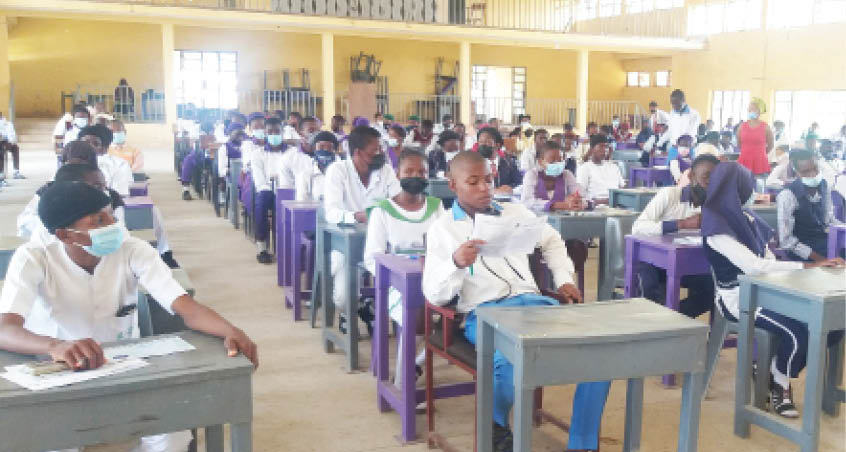History in schools: Welcome back!
The recent pronouncement by the federal government on the re-introduction of History as a subject in our schools has, deservedly, been welcomed by most stakeholders. It is equally heartening that the government has since commenced the training of History teachers for this purpose. Indeed, when the cancellation of History was announced in 2007 with the […]

Cross section of students from different schools participating at the recently conducted Nigerian National Mathematical Sciences Olympiad Competition in Abuja .
The recent pronouncement by the federal government on the re-introduction of History as a subject in our schools has, deservedly, been welcomed by most stakeholders. It is equally heartening that the government has since commenced the training of History teachers for this purpose.
Indeed, when the cancellation of History was announced in 2007 with the launch of the New Basic Education Curriculum for primary and junior secondary schools by the then President Olusegun Obasanjo administration and implemented in 2009/2010 by the government of late President Umaru Musa Yar’Adua, it elicited sharp criticism and wide condemnation because of the danger that ill-informed decision portended for the country.
This is, even though, a few elements had tried to justify the removal of the subject. The few proponents of the idea had argued at the time that History was being shunned by students due to apathy. They also claimed that there were few, if any, job openings for graduates of History as well as absence of qualified teachers on the subject.
Sadly, despite the rejection of the idea by stakeholders in the education sector, students have been denied the opportunity to learn from the past and know the history of the country in the last 12 years. This is no doubt a great disservice to the country.
2023: Nigeria set for best elections in history – INEC
Delta 2022: Team Katsina win historic 16 mdals at NSF
Hopes were raised in 2016 when Minister of Education Malam Adamu Adamu ordered the reintroduction of History as a subject in basic schools. The Federal Ministry of Education even developed another plan on Education for Change: A Ministerial Strategic Plan (2016-2019), containing several laudable initiatives, including the disarticulation of Social Studies and the reintroduction of History in primary and secondary schools. The plan was approved by the National Council of Education (NCE) in September 2016, but it failed to take off.
Again, in March 2018, the National Education Research and Development Council (NERDC), which has the mandate to develop school curriculum, was ordered to start the process of disarticulating History from Social Studies. Specifically, the education minister, during the launch of History curriculum and teacher’s guide in Abuja, ordered the reintroduction of History as an independent subject into the basic and junior secondary schools in the country.
Still, the subject remained largely neglected by schools across the country because they failed to see the urgency in government’s seemingly haphazard approach. Also, with the bulk of Nigeria’s population being 30 years and below, the recent crises that bedevilled the nation can be blamed on the lack of good understanding of the country’s historical background. This is because they don’t know the sacrifices of the nation’s forefathers to the sustenance of the country, among others.
It is in this light that the reintroduction of History should be appreciated. The importance of the reintroduction of History as an independent subject in the curriculum of primary and junior secondary schools in the country cannot be overemphasised. History as a subject allows students to know the struggles and challenges of the country and their importance to nation building, national identity and patriotism.
Commenting on the reintroduction of history in schools, the former President of Historical Society of Nigeria (HSN), Prof. Chris Ogbogbo, said before the coming of the colonial masters, history was critical to the creation of Nigeria as a nation.
“History is very critical when you want to infuse in your citizenship values, patriotism and nationalistic spirit. The people must know who they are, where they are coming from, and they must have an idea of the values and tradition of their society. So, if we are talking about rekindling the nation as a state and as the people of Nigeria, we need to go back to our history.”
We, therefore, join other stakeholders in welcoming the reintroduction of History into our basic education curriculum, even as we urge the government not to relent in ensuring that all schools in the country comply. We must work with guided speed in order to recover lost grounds.
The education minister was correct when he said “This single act (of removing History from our curriculum) no doubt relegated and eroded the knowledge and information that learners could otherwise have been exposed to. It was a monumental mistake and we have already started seeing its negative consequences. The loss created by the absence of this subject has led to a fall in moral values, erosion of civic values, and disconnect from the past. More worrisome was the neglect of the teaching of this subject at basic and post-basic levels of education which invariably eroded the knowledge of the evolution of Nigeria as a country.”
We urge the government to continue the training and retraining of teachers in order to enhance their capacity and equip them with the requisite skills needed to teach the subject so that the impact of the reintroduction of the subject will be felt accordingly. When this is done, Nigerian children will have the opportunity to better understand their past, present and the future, and Nigeria will be better for it.
